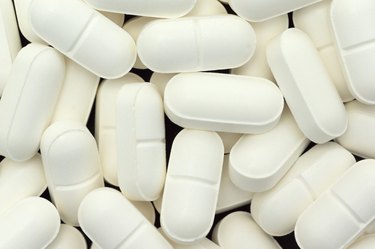
Taurine is an amino acid. Your body requires numerous amino acids, as they play a role in almost every vital physiologic process including muscle growth, neurologic function, protection of cells and proper function of the immune system. Taurine is made up from two other amino acids -- methionine and cysteine. Taking in the proper amount of taurine can help your body perform at its optimum level.
Function of Taurine
Video of the Day
Taurine is most often given with other medications to treat congestive heart failure. Further clinical uses include treatment for cystic fibrosis, exposure to toxic substances and liver disorders. Though not the primary treatment for this condition, taurine is used in conjunction with more powerful medications to improve prognosis and lessen serious complications in patients.
Video of the Day
Dosage
The recommended dosage of taurine is usually less than 3,000 mg per day, MayoClinic.com explains. At this dosage, your body is able to use taurine to power vital processes and excrete any excess via the kidneys. However, at higher doses, taurine may cause unintended side effects. There have been no comprehensive studies on the effects of taurine if taken in large doses or for a long period of time. Consult your doctor prior to taking large amounts of taurine.
How Taurine Works
Taurine is not a true amino acid and as such is not incorporated into proteins. Therefore, free taurine is able to move through various tissues such as the brain, heart and skeleton. This allows taurine to play a role in many biological tasks like detoxification, stabilization of the cell membrane and control of calcium levels. People with congestive heart failure require strict calcium control and strong membranes, while those with liver disease will need extra detoxification.
Sources of Taurine
Taurine is found in most meats, fish and breast milk. Taurine is also commonly added to infant formula because neonates often have a difficult time synthesizing taurine. Many dietary supplements also contain taurine. Though unproven, taurine is purported to enhance athletic performance and is therefore an ingredient in numerous energy drinks. Before taking taurine supplements or energy drinks containing taurine make sure you read their labels to insure that you are not taking more than the recommended daily dose of taurine.